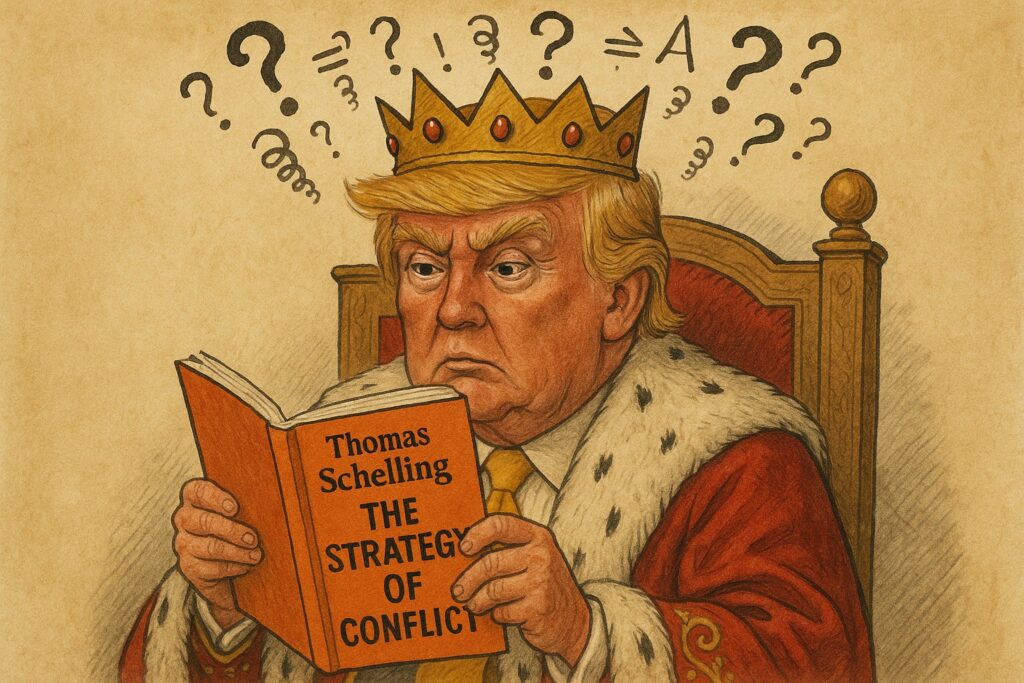It is certain that President Trump’s reply to the TACO (“Trump Always Chickens Out”) accusation will not win him a Nobel prize in economics. The Wall Street Journal reports (“The ‘TACO Trade’ That Has Trump Fuming,” May 28, 2025):
The president rejected claims that he is backing down on tariffs, saying his strategy involves setting a “ridiculous high number” before negotiating it down in exchange for concessions. “You call that chickening out,” Trump said in the Oval Office, adding that “it’s called negotiation.”
It’s called negotiation only when the threat is credible and the author of the threat can, through his reputation or other means, commit himself to follow up on it.
To focus on the theory of negotiation proposed by Mr. Trump, we will assume that international trade negotiations are successful if they reach the goal officially pursued by the ruler-negotiator—in this case, maximizing exports and minimizing imports. In other words, we neglect the fact that the cost of protectionist policies is mostly paid by the subjects of a protectionist ruler.
The Chicken game, an instance of game theory, provides a useful approach. Consider the table below. The chicken metaphor refers to two players, C (Charlie) and D (Donald), who are driving towards each other on the white line of a road to see who will chicken out first and swerve to avoid the collision. The first payoff matrix at the top of the table gives an index of each player’s ordinal utility. The first number in each cell gives C’s utility, and the second number D’s utility. (These payoffs represent each player’s ordinal preference rankings, not cardinal gains.) If none swerves, the two will collide and produce the worst outcome for each player: 0,0. If they both chicken out, they both survive; the payoffs are 2,2 (meaning better than 0 for both). If only one, say D, swerves, he also gets 2, but since he has chickened out, C wins and gets 3, his best result; the payoffs are 3,2. Mutatis mutandis if C swerves. The interpretation for a trade war between two autocratic rulers is obvious: the one who swerves, who chickens out, loses out compared to his most favorable outcome (which he ranks 3).
The bottom part of the table provides a more general characterization of the Chicken game’s structure. In a Chicken game (instead of some other game), T>R>S. The game described in the top part of the table satisfies the condition because 3>2>0.
Another metaphor can be used for the Chicken game: the Hawk-Dove game, which has exactly the same structure, that is, T>R>S. Each of the players can play hawk or dove, in the sense of attack or submission. A player gains the most if he plays hawk (T) and the other submits (R). But if the other also plays hawk, they both face the worst outcome because the fight can result in each being injured or killed (S, S). If they both play dove (R, R), each realizes that he might be better off switching to hawk if the game continues in other rounds. In a one-shot game, the two so-called “Nash equilibria”—situations where no player has an incentive to deviate unilaterally—consist in one playing dove and the other hawk. The Hawk-Dove interpretation of the game can serve to analyze conflicts and bullying. If one player, the bully, succeeds in persuading the other that he will play hawk, the latter’s interest is to submit and play dove. (The first comprehensive discussion of such games in war or negotiation was economist Thomas Schelling’s seminal 1960 book, The Strategy of Conflict.)
In this sort of game (conflictual games with strategic interaction), a threat can only be successful if its author can persuade his adversary that he is committed to following up on his threat—that he is not bluffing. If player D (for example) announces that he wants to play hawk (with “a ridiculous high number”) but that he will retreat as a dove if the other calls his bluff, he is inviting the latter to do exactly that and play hawk. Declaring in advance that one’s threat is a bluff is not a strategy to win but a plan to lose. If I declare that I will play hawk and that you better play dove and, in the same breath, let you know that my threat is not serious, I am inviting you to play hawk. If I tell you that I am ready to chicken out, you are not the one who will.
Mr. Trump has told the whole world and shown that, in trade negotiations, he will back down from his threats if his adversary resists. Indeed, many on Wall Street believe that financial markets have not tanked more because “Trump Always Chickens Out.”
It is virtually certain that, in the EU or even Chinese governments, some advisers to Ms. Van der Leyen or Mr. Xi know how to think of negotiations in terms of game theory and are not scared to tell their rulers what the latter may not wish to hear. Why are there no such advisers in Mr. Trump’s entourage?

******************************

The king studies strategy, by ChatGPT
